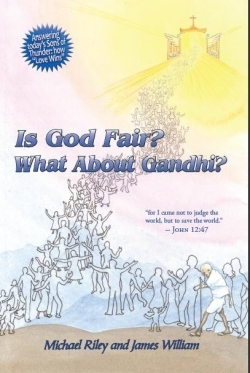Is God Fair? What About Gandhi?
The Gospel's Answer—Grace & Peace
With careful, in-depth study and highly substantiated arguments, authors Michael Riley and James William take on the particularly contentious Christian belief of eternal damnation in Is God Fair? What About Gandhi?, their scholarly yet impassioned effort to “give the reader credible reasons to change his or her beliefs about God’s ultimate plan for the destiny of all mankind.”
The authors’ premise is quite clear from the beginning: there is a severe but unnecessary discord between the “scriptural principles of fairness” and the the traditionally held notion “about the eternal fate of those like Gandhi, who died without faith in Jesus.” This discord has incredible repercussions, perhaps the most important being that it “rob[s] God of His goodness” and has led to what the authors see as a twisted, corrupted understanding and practice of Christianity.
Riley and William take the time to explore the consequences and name the individual questions that arise from these contradictions. Moving further into their argument, the authors methodically discredit the more orthodox understanding of eternal fate, starting with the most basic origins of misinterpretation and translation. They account for historically significant scholars who perpetuated the negative ideas, most notably Augustine of Hippo, as well as those who fought for what the authors interpret as the correct understanding of universal salvation. The authors also spend an entire chapter on Paul and his gospel, which they dub as “forgotten by the Church.” Other chapters point out inconsistencies in Augustinian theory, refute typical arguments regarding the validity of eternal punishment, and highlight sections in the scriptures that clearly emphasize that God’s plan is for widespread salvation.
The book perfectly matches the expectations of a scholarly text. For every claim made, Riley and William provide a strong foundation of extensive background information before even discussing their point. This is followed up with multiple examples, each of which is exhaustively broken down and tied back to their original point. This approach is taken so often that it can sometimes feel a bit redundant or overwhelming, but the authors’ efforts to fully support their own case offers readers the opportunity to educate themselves and to consider their own beliefs.
The authors’ writing style may initially seem at odds with the research-based content of an academic work. In their preface, Riley and William freely admit that they “write like [they] talk,” with a purely conversational tone. This makes the work much more approachable. The authors also continually review the material that has been covered in previous chapters as well as preview the content that is to come. While this can at times feel a little unnecessary, it does keep the more casual reader from getting lost.
Riley and William’s style also includes emphasizing words and phrases with boldface, underlining, and italics. The technique is intended as an instructive tool, making the book more like a guide through the theories and ideas presented. However, at times it is employed to simply highlight a word the authors might stress when speaking. Ultimately, the strategy becomes over-utilized and detracts from a fully professional presentation.
Not everyone will agree with the conclusions arrived at in this book, but the authors accomplish their goal by providing concrete arguments that will encourage all readers to question and reexamine their beliefs, and to come to own those beliefs more fully no matter what they may be.
Reviewed by
Alicia Sondhi
Disclosure: This article is not an endorsement, but a review. The publisher of this book provided free copies of the book and paid a small fee to have their book reviewed by a professional reviewer. Foreword Reviews and Clarion Reviews make no guarantee that the publisher will receive a positive review. Foreword Magazine, Inc. is disclosing this in accordance with the Federal Trade Commission’s 16 CFR, Part 255.

